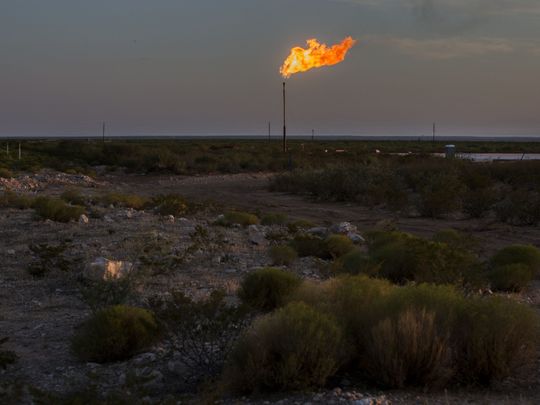
Abu Dhabi: The energy landscape has been changed as a result of the US becoming the world’s leading oil producer, said a top US official at Adipec on Tuesday, who also affirmed his country’s commitment to securing the region’s energy resources.
Speaking on the second day of Adipec, Frank Fannon, assistant secretary at the US Department of State’s Bureau of Energy Resources, said the US was on track to producing 13 million oil barrels per day next month, and also on course to becoming the world’s top liquefied natural gas (LNG) exporter within the next five years.
“The US has and continues to transition from energy scarcity to energy abundance, this shift benefits the US and also benefits the rest of the world … US energy abundance offers countries with new levels of opportunities to secure the energy that they need.
“Governments around the world are still coming to terms with this reality and reconciling the implications; this is understandable,” he added.
“Congress lifted the oil export ban in 2015 … [and] today the US is the largest producer in the world and on track to produce 13 million barrels next month,” he said.
Fannon also spoke on the US’s gas export ambitions, which he said would see the US becoming the top provider of LNG.
“In 2016, when the US began exporting LNG in earnest, we were the 15th largest exporter in the world. Today the US is third and in the next five years we’re projected to be the top LNG exporter.”
Commenting on Opec, Fannon said he believed the group was still relevant, but that it would be challenging to work on joint policies similar to Opec+ as the US oil industry is largely privately driven.
“Opec will continue to endure and is relevant, but how they do they respond to the US given the way in which we operate.
“It’s not a matter of government control … The US [government] doesn’t determine our production levels, and I think that’s for the best. Our energy abundance is based on private sector led growth and a response to market conditions,” he added.
US commitment
Commenting on the US role in the Gulf, Fannon said the administration was still committed to the region highlighting how the US had sent in additional US troops in the wake of the Saudi oilfield attacks that took place in September.
“The attack on Saudi Arabia’s energy complex was a direct attack on the kingdom, however, the perpetrators target was in fact all of us, the global energy consumer.
“The support of sending the troops to the region I think is a further demonstration of our commitment here …” he added.
Fannon acknowledged the growing Russian role in the region, but said he didn’t believe that it was due to the US abandoning its regional role and that US firms still held the edge over their Russian counterparts.
“When a country partners with a US firm they’re doing it because it makes sense … it’s a shared valued win-win concept, and most importantly they respect the sovereignty of the countries they operate.
“I can’t speak to Russian partners in that regard, but I think the level of investment the US can bring and what are the intangibles, the growth and alliance that can support the host country stands the test of time,” he added.











